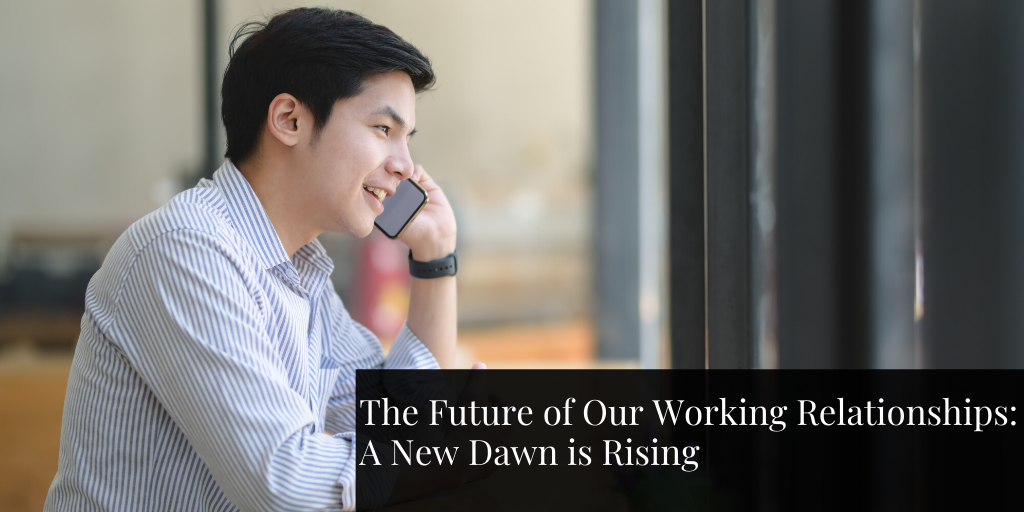
Have you noticed the relationships that we choose to enter and exit, in life and work, are evolving into a less structured mass?
Marriage and monogamy. It used to be one person, for life. Now, it's often one person at a time. What each gender is seeking in a life partner is different. The historical course of marriage was a pragmatic institution that supported our basic survival needs of food, clothing and safety.
Men sought a homemaker, someone who would have dinner on the table when they came home, and eventually bear them offspring. Women saw marriage as a means of guaranteeing their financial security, a sure roof over their head, and often, it was their ticket to a better [easy?] life. You may have been miserable as soon as you entered into marriage, but you were stuck for life. That is not the case today, and here's why.
As the world progresses towards equality, women's economic and social empowerment has resulted in seeking an equal partner in love and in life. Gone is the lifetime union driven by security, and in its place is the sought-after relationship based on love, intimacy and mutual personal growth.
In my grandparents' era, love wasn't in the equation, let alone on the relationship radar. Renowned psychotherapist Perel points out, "We used to rely on an entire village to meet our innate human needs of connection, support, belonging and companionship. Now we want our partners to help us explore our feelings and our identity, to bring out the 'best' most authentic versions of ourselves". Yes folks, we've climbed Maslow's Hierarchy of Needs quite rapidly.
The rules and expectations used to be clear and rigid. Instead, they have been replaced by choices, and plenty of them. The new 21st century sign of commitment? Deletion of apps.
Should we be surprised the relational shift in our personal lives has spilled over to our careers?
One company for life was the expectation a generation or so ago. Now, 18-24 months in a role is an acceptable standard. Gone is the career ladder, replaced by a career diamond where workers expand their skills and experience laterally, before ascending the pecking order if they are that way inclined. Contracting has risen in prominence, with on-demand workers regularly juggling multiple roles and companies. The 21st century symbol of career commitment? The willing transition from contractor / digital nomad to FTE.
Expectations of what we derive out of our careers are at an all-time high. In bygone eras, it was simple and linear. Clock in, do an honest day's work, clock out, get paid. Rinse, repeat. Now, we expect our employers to fulfill many of our needs: we want to feel secure, yet maintain our independence, we favor intellectually stimulating work over repetitive tasks, we want to bring our real selves to the office, to be granted the freedom to explore and emphasize our individuality, and we want to work for supportive managers who are confidant, coach, guide and sounding board all rolled into one. Oh, plus provision of meaningful volunteering opportunities, and we'd like our company to invest in developing us into more well-rounded individuals too. Expecting, much?
A new dawn is rising. Toxic workplaces are characterized by rampant distrust, disrespect and a lack of inclusion. Safety, psychological and emotional safety, is key to building trust, the foundation of effective high performing teams. Empathy, dependability and authenticity play a pivotal role in inspiring the workforce. It's all about the qualitative experience now - our work needs to be transformative, illicit curiosity, provide meaning and be personally fulfilling to boot.
Companies with relational intelligence and 'enlightened' leaders are spearheading a higher level of consciousness which inextricably links emotions and qualities previously labelled as "soft" to increased sustainable performance. This reflects our need for belonging and connection - whether it's in the home or the office (perhaps indicating the worrying disconnection and isolation faced by society today), and the changing expectations we now have for all relationships.
More and more companies are encouraging us to bring our whole selves, our authentic selves, to work. It’s time we remove our masks and start forging real connections with our colleagues. Connections create culture. Culture creates competitive advantage. Got it? Good.
Harvey Mackay said, "The quality of your life is determined by the quality of your relationships. The quality of your business is no different."
I'd have to agree.
Let us help you create a happier culture for a more sustainable future.

Friska Wirya is a Change Management Expert, Leadership and Management Consultant at Fresh by Friska. She has led change programs impacting up to +23,000 people across the seven continents for WorleyParsons, one of the largest engineering companies in the world. She has worked in top tier global companies in mining, engineering, and technology, and built the change management practice at Fujitsu Australia. A lifelong learner and self-confessed geek, her effectiveness at managing the people-side of change has proven to be a compelling productivity-boosting strategy. www.freshbyfriska.com